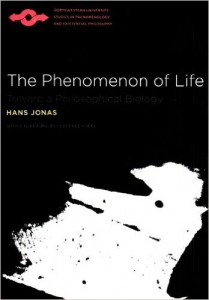AR: Darwinism is blamed by some and praised by others for being conducive to reductive mono-causal accounts of human agency. Yet, there have always been thicker post-Darwinian accounts of nature (human and otherwise) such as the evolutionary Great Chain of Being proposed by phenomenologist Hans Jonas in The Phenomenon of Life. How does evolutionary theory, given its immense and ambivalent cultural impact, fit into your understanding of nature and the human person after nominalism? I was surprised to find only a few passing references to Darwin and his theories in Minding the Modern.
TP: Literature about the impact of Darwin on the modern (and contemporary) world is obviously abundant, and many divergent strands of interpretation have emerged within Darwinism. I have followed some of these debates with interest but never thought that they particularly impinged on the topic of Minding the Modern. For one thing, my narrative concludes around 1830, with a discussion of Coleridge’s late theological and philosophical writings. To have ended there may, of course, strike some readers as arbitrary and regrettable; and I readily concede that much has happened since that relates in interesting ways to questions of human agency, responsibility, and related concepts and questions.
Now, if one separates Darwin’s oeuvre from the tangled and contested legacy to which it has given rise over the past hundred-fifty years, its bearing (still only tangential) on my narrative in Minding the Modernbecomes clearer. First, Darwin indeed produced a crisis within religious culture by exposing a misguided and simplistic epistemology mainly underwriting (Anglo-)Protestant, literal accounts of creation. As we know, say, from Janet Brown’s marvelous two-volume biography, confounding such accounts was something Darwin had not specifically meant to do and, in fact, found rather painful. Still, as I point out (MtM, 486-87), the dismantling of Paley’s natural theology also spelled the end of a one-dimensional practice of Scriptural exegesis that, beginning in the late sixteenth century, had progressively impoverished the spiritual and ethical potential of reading. Erich Auerbach (“Figura”) and Hans Frei (The Eclipse of Biblical Narrative) have told the story of interpretive possibilities and Scriptural meanings gradually foreclosed particularly well.

What Darwin’s Origin threw into stark relief, then, was Anglo-Protestantism’s gradual and ill-considered metamorphosis into a moral-cum-social theory during the preceding century-and-a-half. The Origin of the Species was but the last and most powerful ringing of the death-knell announcing the demise of Anglo-Protestantism’s untenable moral epistemology. Between the time of Lyell’s Principles(1830-33), R. Chambers Vestiges (1843), whose impact on the religious culture of the 1840s James Secord has unfolded in admirable detail, and Darwin’s Origin (1859), Anglo-Protestantism came to find itself in full-blown crisis. It was a crisis largely of its own making (and only incidentally exposed as such by the writers just mentioned); that is, the crisis arose from the ways in which Anglo-Protestantism had gradually assimilated questions of soteriology to ideas about social propriety; the way it had progressively construed the Creator-God as a remote, unfathomable, uninvolved, and ultimately uninteresting epistemological “First Cause”; the way that since 1688 it had allowed ecclesial and liturgical practice of faith to be supplanted by the seemingly adventitious and inarticulate notion of private “belief”; and the way that its increasingly thin account of Grace was being replaced by either latently or explicitly Pelagian ideas about moral self-governance, propriety, and by a culture of theologically uncurious conformism.
It is telling that the theologian who most brilliantly exposed this untoward development, John Henry Newman, proved altogether untroubled by Darwin’s theory. In fact, as the late Owen Chadwick has argued (and I agree, MtM61), Newman’s theory of development has frequently and with good justification been viewed as a precursor to Darwin’s narrative in The Origin of the Species. Likewise, I regard Newman’s Grammar of Assent as perfectly compatible with Darwinism. Still, there is a limit to that compatibility, and it is reached with the later Darwin’s speculative extension of his naturalist epistemology into a sweeping account of human nature and behavior in The Descent of Man. Had Minding the Modern extended forward into the late nineteenth century, some engagement with that rather more problematic and uneven work of Darwin would indeed have been called for.
Continue to Part 2 of this interview…
You might also want to take a look at the post Did Darwin Kill God? to see how Darwin did not wreck God’s ship by ramming it with the Beagle.
While you’re at it, Thomas Pfau’s list of the 11 most important critiques of modernity is an indispensable guide.
Last and least: Remember to pour a little gas in my tank via the PayPal donation button on the right side of my homepage.












